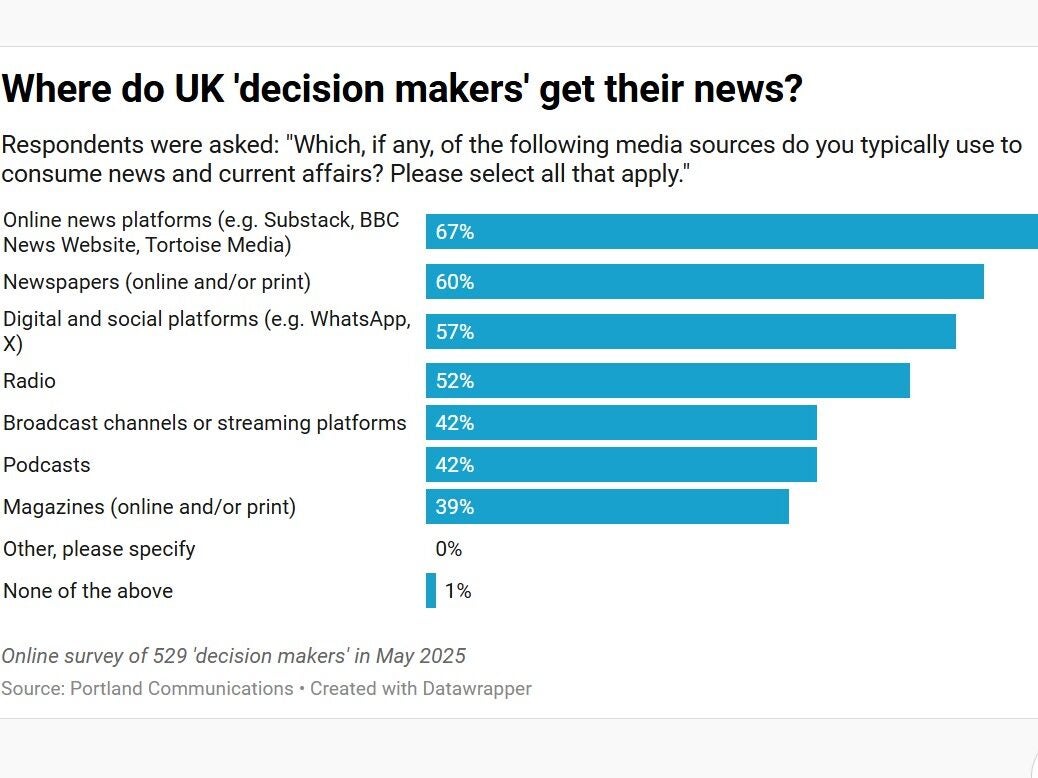
Nearly half of UK adults have used AI tools to stay up to date with news and current affairs, according to new research by communications agency Portland.
In a major survey it found that 47% of UK adults had used tools such as ChatGPT and Google Gemini to better understand current events.
When it comes to ‘decision makers’ (those in senior jobs and leadership positions) the proportion using AI tools to access news rose to 81%.
Portland, which is a member of the British Polling Council, carried out its online research in April and May 2025.
An initial weighted survey of 4,573 UK adults was followed by a second survey of 529 people defined as decision makers.
Decision makers skew two thirds male and are estimated by Portland to make up 10% of the UK population. They include: senior management in public and private sectors, private sector workers earning more than £75,000 who also meet other criteria, journalists, academics and those involved in the formulation of public policy.
The research found that decision makers are also highly engaged in the news and are likely to name-check well-established journalism brands if asked where they get their information from.
Portland CEO Simon Whitehead said: “Our research shows that if you want to reach those who shape Britain’s future, you need to understand how their news habits are changing.
“AI is now a core part of the news ecosystem for decision makers, and trusted brands like The Guardian and BBC still matter. To reach them, communications professionals need to consider two audiences: people and algorithms.”
Despite the increasing use of AI tools, UK adults do not trust them. When they were asked to name the most trustworthy source some 44% said “news website” versus 4% “AI tools”.
The research found that some 60% of UK adults have used AI assistants.
This proportion rose to 89% when it comes to the decision makers who were asked which AI tools they have used.
The research found that decision makers are highly engaged in news and current affairs with 88% saying tracking the news was at least helpful to them in their jobs, and 26% saying they needed to follow the news constantly. Among the general public some 66% said news monitoring was at least helpful to their work.
When UK adults were asked where they get their news, traditional sources still dominate with radio and online publisher news platforms cited by 48%, followed by broadcast news channels (42%) and newspapers in print and online (41%).
When it comes to decision makers, online news platforms and newspapers (print and online) dominate. But they are also more likely to cite social media platforms such as Whatsapp and X. There also twice as likely to listen to podcasts for news (42%), versus the general public (21%).
When the general public were asked to name the newspapers they read, only 1,853 out of 4,573 respondents answered this question and the Daily Mail finished top.
When it comes to decision makers, the (free) Guardian finished ahead of the paywalled Times in terms of the newspaper brands which they read, with The Sun in third place. Some 329 out of 529 decision makers surveyed answered this question.
When decision makers were asked where they get their radio news from, some 44% cited Times Radio versus 39% for Radio 4, suggesting the channel has strong reach amongst those in leadership positions. Some 299 out of 529 decision makers surveyed answered this question.
The survey suggested that Meta-owned platforms Facebook and Instagram dominate when it comes to the social media channels which are used to access news.
When it comes to decision makers, Facebook, Instagram and X are the dominant social media channels used to access news. X has become a negligible source of referral traffic for publishers since it was taken over by Elon Musk in October 2022, but this survey suggests it remains influential.
Facebook was also most likely to be cited by UK adults as a source of misinformation. Some 28% out of 4,573 people surveyed said they had come across misinformation on the platform.
Around one third of the general public said they receive daily email newsletters to keep up to date with news and current affairs versus 80% of the decision makers who answered this question.
Email pged@pressgazette.co.uk to point out mistakes, provide story tips or send in a letter for publication on our "Letters Page" blog
